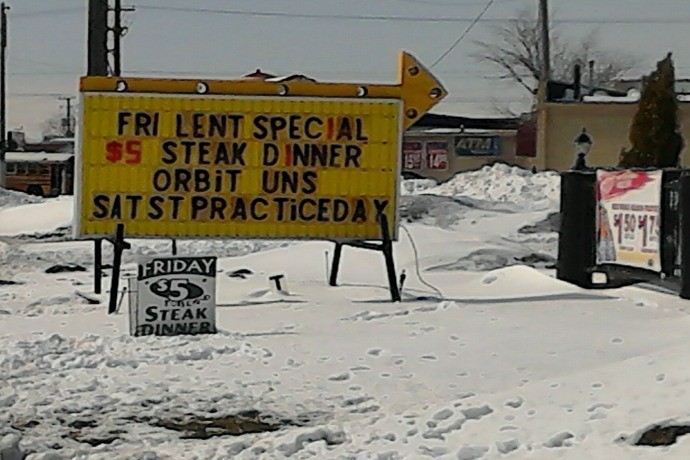A few years ago, I gave up eggs and dairy for Lent. This wouldn’t have been a particularly weird thing to do were it not for the fact that I wasn’t raised Catholic—I was baptized in an Orthodox church—and also I don’t believe in God.
Some things came together for me. First, I was feeling hypocritical because all the reasons I had for being vegetarian applied just as much to eating eggs and dairy, and there I was eating eggs for breakfast in my campus dining hall. Second, I noticed that some of my other classmates who were eating breakfast had ash crosses on their forehead, which presumably meant they were in the Lenten season. And third, I had just finished reading Alain de Botton’s Religion for Atheists, whose “maybe religion isn’t completely terrible, guys?” message made a lot more sense to me than the “religion poisons everything” vibe every other atheist book tended to give off.
Religious doctrine and religious practice often pull apart, and there’s no reason to toss the latter out along with the former. Judaism is perhaps the clearest example. According to Pew, a third of millennials identify both as Jewish and as having no religion, and, on the whole, almost two thirds of American Jews say that being Jewish is mostly about ancestry and culture. Belief in God seems somewhat incidental, too—more than half say it’s possible to be a Jew without belief in God, and about one third either don’t believe in God or aren’t too certain about God’s existence.
This shouldn’t feel weird to anyone with Jewish friends. I’ve known secular Jews to host Shabbat dinners and fast on Yom Kippur. One even became a Rabbi. But this tendency is more common in some religions than others. Could someone say they were a Christian even if they didn’t believe in God? Much fewer do, at least. 98 percent of Christians say they believe in God, and 76 percent are certain.
But what happens if—like Jews—American Christians become less religious? Do they drop the practice along with the doctrine?
Catholicism might be an interesting case study. Christianity in America is largely in decline, and Catholicism has been hit the hardest by far. Though 30 percent of American adults were raised Catholic, fewer than two-thirds of them stay with the Church. This means that 13 percent of American adults are lapsed Catholics. And unlike other branches of, say, Protestantism, there are more obvious historical, cultural and ritualistic aspects to Catholicism—from Mass to Ash Wednesday, and from Lent to confession.
Perhaps more than any other Christian denomination—where we might nominally celebrate Christmas and call our parents on Easter but not much else—there’s more left to Catholicism once the Nicene Creed is gone.
I’ve practiced Lent a few times—I know there’s more to doing what’s right than realizing what’s right. The average vegetarian in America eats a serving of meat every day, and moral philosophers are actually no more likely than their peers to act on their beliefs. As unflattering as it is to admit, we often need help living out our values, be it from community support or better structured environments. Lent seems a natural way to do this.
This isn’t a particularly original idea, and I have much less claim to the holiday than many other nonbelievers. A few years ago, The New York Times profiled a few atheists who were practicing Lent, and many of them were doing so because they had grown up Catholic and no longer believed. John Corvino, an atheist and author of What’s Wrong with Homosexuality?, grew up Catholic and appreciates Lent’s capacity for fostering self-discipline.
But is it fair for me to practice something I never did as a child? Most of my religious rituals growing up surrounded Easter—which fell on a different date on the Orthodox calendar. We would knock our eggs together in small competitions and float the shells (like our sins) down bodies of water (a creek by my house). My mother fed me tuna on Easter morning (Jesus’s feeding the multitudes), and had me see my reflection in red food coloring (for rosy cheeks and good health). Continuing these practices would be different than practicing Lent since I wouldn’t be borrowing a culture that isn’t my own.
Some—like Catholic theologian Virginia Kimball—are apparently fine with it. When Kimberly Winston at Religion News Services wrote a piece about atheists practicing Lent, Kimball gave her blessing. Others, however, see it as trivializing. Jennifer Graham at Acculturated saw my efforts as “a chance to mock Christians by doing what Christians are supposed to be doing.” While that certainly wasn’t my intent, I don’t necessarily blame her for reading it that way.
In Denmark, fewer than a third of Catholics actually believe in God, but the traditions and practices keep them together. I think this is more or less the future of both religion and atheism in America. I don’t think the future of atheism will look much like a Richard Dawkins book signing, but neither will Christianity look much like a bible study. Like secular Jews practicing Shabbat and atheists practicing Lent, we’ll meet at the crossroads of our cultures.





